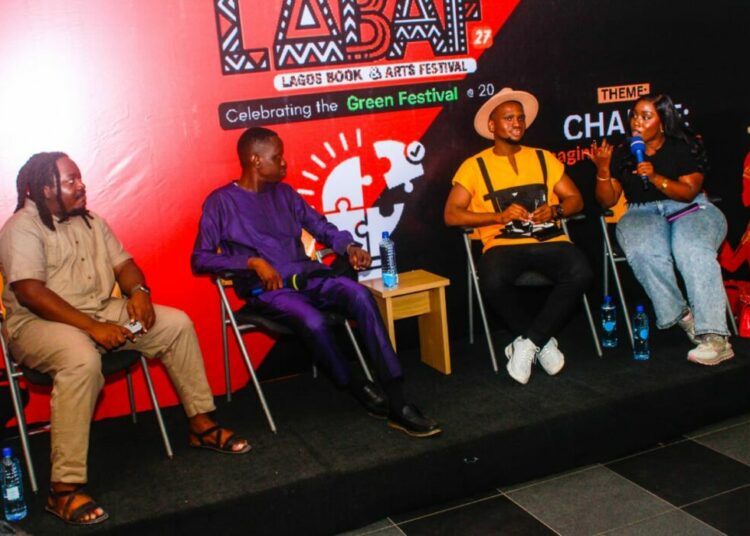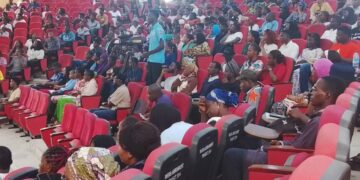Tech experts have urged regulators of the creative industry to adopt Artificial Intelligence (AI) to reshape professions and advanced the future of workforce, urging the need to shift from fear to strategic adoption for career sustainability.
The message was conveyed during the 2025 Lagos Book and Art Festival at Freedom Park, Lagos Island, where the discussion centered on navigating the profound disruptions and opportunities AI presents.
Speaking at the panel session of tech creative, titled “Building a Sustainable Creative Career in the AI Era,” featured insights from a panel of experts, including Habib Ajijola, a product growth expert and founder of a Venture and Growth conglomerate, Growthverse; Babatope Oni, the Co-Founder and CTO of Gigbanc, and Amanda Uzoagba, an entertainment lawyer and Head of Licensing for Africa at Mdundo.
The session was moderated by Founder of Fairchild Media, Femi Morgan.
Addressing the threat of AI to future workforce and jobs, growth expert and founder of a Venture and Growth Conglomerate, Habib Ajijola framed the situation with stark clarity, stressing that, “AI is coming to take your job. I think that’s the reality and the mindset you need to work with.” He emphasised the technology’s rapid acceleration.
He illustrated the threat with a personal anecdote, revealing how an AI generated a project soundtrack in seconds—a task that previously took months and significant expense. “This is the end of 90% of corporate jingles and gigs for musicians,” Ajijola warned.
The panelists unanimously advised creatives to view AI as a collaborative tool rather than a competitor.
Also speaking, Co-Founder and CTO of Gigbanc, Babatope Oni, urged artists to leverage AI as a “Personal Assistant” for tedious tasks, freeing up time for uniquely human creativity. “Look for the advantage AI offers you and make sure that you’re maximizing it,” he said.
Speaking further, he said: “The people who will thrive are not those who fight the change, but those who learn to control it. Look for the advantage AI offers you and make sure that you’re maximizing it—your unique human experience and creativity become your premium in a world of automated output.”
He further advised, “If you just sit down and feel that AI will take your job, it will take your job. But if you stand up and learn to use it, you will be the one taking the jobs.”
Entertainment lawyer and Head of Licensing for Africa at Mdundo, Amanda Uzoagba, addressed the critical legal challenges, noting that copyright laws were lagging behind the technology. “An AI system shouldn’t train on materials without permission,” she stated, highlighting ongoing legal battles.
She also offered a strategic advantage for local talent. “While AI can generate a script, it cannot imbue it with the authentic soul of our culture. It doesn’t understand the subtle nuances of a Lagos ‘chop breakfast,’ the cadence of a proverbial warning from a grandmother in the village, or the unspoken rules of a typical Nigerian family meeting.
“This inherent limitation of AI is, in fact, your greatest professional advantage. Your value is no longer just in putting words on a page; it’s in your innate cultural intelligence.
“Therefore, your work fundamentally evolves—you are no longer just a script writer, but an essential story consultant and cultural architect, the irreplaceable human element that ensures a story doesn’t just exist, but that it truly feels Nigerian,” he stated.
As the curator and moderator of the panel, Morgan framed the discussion around AI not as a speculative future, but as a present-day reality critical for professional survival.
He asserted that technological proficiency was no longer optional for creatives, but a fundamental requirement for scaling their work and achieving sustainability. His central argument was that informed adaptation is the only viable path, as resistance to technological shifts has historically led to professional obsolescence.
He starkly summarised this imperative by stating, “Those who resist new waves of technological advancements pay a heavy price for it in their careers and life.”
The session concluded that for Nigerian creatives, the path forward lies in strategically harnessing AI to enhance, not replace, their irreplaceable human artistry.





